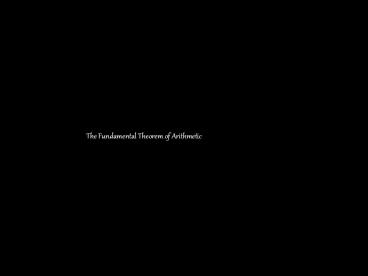The Fundamental Theorem of Arithmetic - PowerPoint PPT Presentation
Title:
The Fundamental Theorem of Arithmetic
Description:
... 7 only Primes Compute the prime factorisation of n The Fundamental Theorem of Arithmetic Every positive integer can be expressed as a unique product of ... – PowerPoint PPT presentation
Number of Views:1553
Avg rating:3.0/5.0
Title: The Fundamental Theorem of Arithmetic
1
The Fundamental Theorem of Arithmetic
2
Primes
- p gt 1 is prime if the only positive factors are
1 and p - if p is not prime it is composite
The Fundamental Theorem of Arithmetic
Every positive integer can be expressed as a
unique product of primes
My name is Euclid
3
Primes
There is no other factoring!
4
325BC to 265BC
Euclid of Alexandria
5
Primes
Euclids words if a number be the least that is
measured by prime numbers, it will not be
measured by any other prime except those
originally measuring it Where measuring is
dividing
The Elements
6
(No Transcript)
7
Proof of Fundamental Theorem of Arithmetic
- Well Ordering Principle (WOP)
- every non-empty set of positive integers has a
least element
RTP Every integer n gt 1 can be written as a
product of primes
- If n is prime we are done
- n is composite and has a positive divisor 1 lt p
lt n - let p1 be the smallest of these divisors
- p1 must be prime otherwise
- there is an integer k, 1 lt k lt p1, and k divides
p1 - consequently n n1 times p1 (i.e. n1 n ?
p1) - where p1 is prime and n1 lt n
- repeat the argument with n1
- If n1 is prime we are done
- otherwise n1 n2 times p2
- where p2 is prime and n2 lt n1 and p2 ? p1
- this process terminates due to the WOP
8
PRIMES
- The dumb way to test if n is prime
- if n is divisible by 2 return(composite)
- if n is divisible by 3 return(composite)
- if n is divisible by 4 return(composite)
- if n is divisible by n-1 return(composite)
- return(prime)
Question is n (n gt 2) ever divisible by n-1?
9
PRIMES
Therefore, the divisor a or b is either prime or
due to the fundamental theorem of arithmetic, can
be expressed as a product of primes
(p 211 6th ed, p 155 5th ed)
10
PRIMES
We now have a test for primality If a number is
not composite it is prime If a number is prime
then it does NOT have a prime divisor less than
or equal to ?n Therefore we can test if n is
divisible by primes in the range 2 to ?n If
none are found n must be prime
11
Primes
Prove that 41 is prime
To be prime, 41 must not be composite
If composite 41 has a divisor less than or equal
to square root of 41
The only primes not exceeding 6 are 2, 3, and
5 None of these divides 41 Therefore 41 is not
composite, it is prime
Remember floor(x) ?x? the largest integer
smaller than x
12
Primes for the class!
Prove that 67 is prime
To be prime, 67 must not be composite
If composite 67 has a divisor less than or equal
to square root of 67
The only primes not exceeding 8 are 2, 3, 5, and
7 None of these divides 67 Therefore 67 is not
composite, it is prime
13
Is 51 prime?
Consider prime divisors 2, 3, 5, 7 only
?
14
Primes
Compute the prime factorisation of n
The Fundamental Theorem of Arithmetic
Revisited
Every positive integer can be expressed as a
unique product of primes
15
Primes
Compute the prime factorisation of n
- assume nextPrime(i) delivers next prime number
greater than i - nextPrime(7) 11 and nextPrime(nextPrime(7))
13 - floor(sqrt(n)) delivers largest integer ? square
root of n - floor(sqrt(97)) 9
p 2 // the 1st prime rootN floor(sqrt(N))
// where we stop while p lt rootN do begin
if pn then begin print(p) //
p is a prime divisor n n/p
rootN floor(sqrt(n)) end
else p nextPrime(p) end print(p)
16
Primes
p 2 // the 1st prime rootN floor(sqrt(N))
// where we stop while p lt rootN do begin
if pn then begin print(p) //
p is a prime divisor n n/p
rootN floor(sqrt(n)) end
else p nextPrime(p) end print(p)
N p rootN
7007 2 83
7007 3 83 7007
5 83 7007 7
83 print 7 1001 7
31 print 7 143 7
11 143 11 11 print
11 13 11
3 print 13
7007 7.7.11.13
17
Greatest common divisor gcd(a,b) and Least common
multiple
- gcd(a,b) is largest d such that da and db
- if gcd(a,b) 1 then a and b are relative prime
- lcm(a,b) is the smallest/least x such that ax
and bx
- 3 Naïve algorithms for gcd(a,b)
- start with x at 1 up to min(a,b) testing if x
a and x b - remember the last (largest) successful value
- start with x at min(a,b) and count down to 1
testing if xa and xb - stop when the first value of x is found
- compute the prime factorisation of a and of b
- and then see below
18
Greatest common divisor gcd(a,b)
- gcd(120,500)
- prime factorisation of 120 is 2.2.2.3.5
- prime factorisation of 500 is 2.2.5.5.5
20
but there is a better algorithm (wots an
algorithm?)
19
(No Transcript)
20
Lowest/least common multiple lcm(a,b) smallest
x divisible by a and by b
- lcm(95256,432)
- prime factorisation of 95256 is
2.2.2.3.3.3.3.3.7.7 - prime factorisation of 432 is 2.2.2.2.3.3.3
190512































